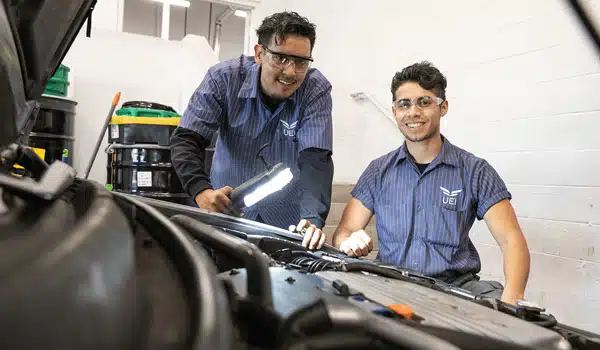What Do Automotive Technicians Do?
| Update: September 05, 2024
Becoming an Automotive Technician involves much more than just tinkering on cars with tools. Sure, automotive technicians work with their hands and fix cars, but they also use the latest technology to diagnose computer issues and work with customers to identify needed maintenance and make a plan for the future.
With millions of cars on the road, there is a great need for skilled automotive technicians who know how to troubleshoot and fix automobiles. If you are interested in a career as an automotive technician but want to know exactly what that entails, this article can help you out!
Also, if you're interested in becoming an automotive technician, consider enrolling in UEI College's Automotive Technician Program. The program is short-term, allowing you to earn an Automotive Technician Diploma in as few as 10 Months.
What Does An Automotive Technician Do?
An automotive technician, also known as a mechanic or auto service technician, is a skilled professional responsible for diagnosing, repairing, and maintaining vehicles. Their primary role is to ensure that automobiles are in optimal working condition and perform the necessary repairs and maintenance tasks to keep them running smoothly. Here is a brief description of what an automotive technician does:
Diagnosing Problems: Automotive technicians use their knowledge and expertise to identify and diagnose issues in vehicles. They utilize diagnostic tools, computer systems, and their understanding of automotive systems to pinpoint problems accurately.
Repairing and Maintaining Vehicles: Once the problem is identified, automotive technicians perform repairs and maintenance tasks. This may include fixing mechanical and electrical issues, replacing faulty parts, performing oil changes, aligning wheels, and conducting routine inspections to ensure the vehicle's safety and reliability.
Conducting Vehicle Inspections: Automotive technicians often perform comprehensive inspections of vehicles, especially during routine maintenance or pre-purchase inspections. They assess various components such as brakes, suspension, engine performance, and emissions to determine if any repairs or adjustments are needed.
Following Service Procedures: Automotive technicians follow manufacturer-recommended service procedures and guidelines to ensure that repairs and maintenance are carried out correctly. They may consult service manuals, technical specifications, and computerized databases to obtain accurate information.
Utilizing Tools and Equipment: Automotive technicians use a wide range of tools and equipment to perform their tasks effectively. These include diagnostic scanners, wrenches, sockets, lifts, and specialized tools for specific repairs. They must have knowledge of how to safely and efficiently use these tools.
Keeping Records: Automotive technicians document their work by maintaining detailed records of repairs, parts used, and services performed. This information is essential for future reference, warranty claims, and maintaining accurate vehicle histories.
Continuous Learning: With the rapid advancements in automotive technology, automotive technicians must stay up-to-date with the latest industry trends and innovations. They may undergo regular training and certification programs to enhance their skills and knowledge.
In summary, an automotive technician diagnoses, repairs, and maintains vehicles, ensuring they are safe, reliable, and perform optimally. Their expertise and dedication play a crucial role in keeping vehicles on the road and satisfying the needs of vehicle owners.
What Skills Do Auto Technicians Need?
Auto Technicians need plenty of skills and training to do their job effectively. Trained automotive technicians need:
Knowledge About Vehicles
Having a job fixing cars requires some good knowledge about cars that are on the road and how they work. You should be familiar with the fuel system, brake system, ignition system, exhaust system, suspension and steering, and the engine. These systems may be different or may be located in different areas depending on the type of vehicle. This knowledge will be key to identifying issues and fixing them.
Technical skills
Many drivers could probably tell you what kind of car they drive, how many miles it has been driven, and where the wheels are, but actually performing repairs and maintenance on that vehicle takes knowledge and practice. Automotive technicians need to know the tools to use, the equipment to diagnose an issue, and the safest way to do the job.
Basic computer skills
As technology advances, more and more of it is being put into the cars we drive. Even auto technicians need to be comfortable working with technology and computers. In addition to the computers in the vehicle, you’ll use a computer for creating invoices, ordering parts, and looking up error codes, warranty information, and vehicle manuals.
Problem-solving skills
When dealing with technology and mechanics, there are always times when you think you know the problem—only to be viewing it from the wrong angle. Luckily being an automotive technician allows for some degree of trial and error. The key is being willing to try and try again until the problem is solved. This is a skill that takes practice, but after a while, it will come naturally.
Customer service
Customer service is a skill some technicians may overlook, but it could mean the difference between a customer returning or leaving a poor review. An automotive technician’s business is built on trust. Many customers who bring their vehicle into a shop are worried about the cost and stressed about the impact car troubles may have on their day. What they want is to know the technician they are dealing with can solve the problem, but an empathetic ear and a warm smile go a long way towards comforting their nerves and giving them confidence in your work ethic.
Attention to detail
When you are working with complex systems, using the wrong fluid, lubricant, or bolt can have a huge impact. Failure to notice a crack, a leak, or a misplaced tool can put the technician and the driver in great danger. It’s so important for automotive technicians to pay close attention to the small things to ensure their work is safe.
How To Become an Automotive Technician?
Becoming an automotive technician takes training and experience, but it’s easier than you may think. You can become an automotive technician in just four steps:
- Earn your high school diploma or equivalent. You do not need a college degree to become an automotive technician, but most employers require a high school diploma. Call us to learn about UEI College's automotive technician program.
- Enroll in a training program. A hands-on training program is important to give you the knowledge and skills you need to enter the field quickly and confidently.
- Get certified. It’s possible to find an entry-level position without certifications, but certifications will make it possible to advance in the field and specialize in certain areas.
- Find a job. Once you have the skills and knowledge, you are ready for an entry-level position. With training from UEI College, you can access our Career Services Department to help you in your job search.
Consider Enrolling in UEI College's Automotive Technician Program
If you love working on cars and are serious about pursuing a career in this field, UEI College has the resources and support to help you prepare for an entry-level position as an automotive technician.
Enroll today, and you can be ready for a new career in less than ten months. Give us a call today to learn more about the Automotive Technician Program.





